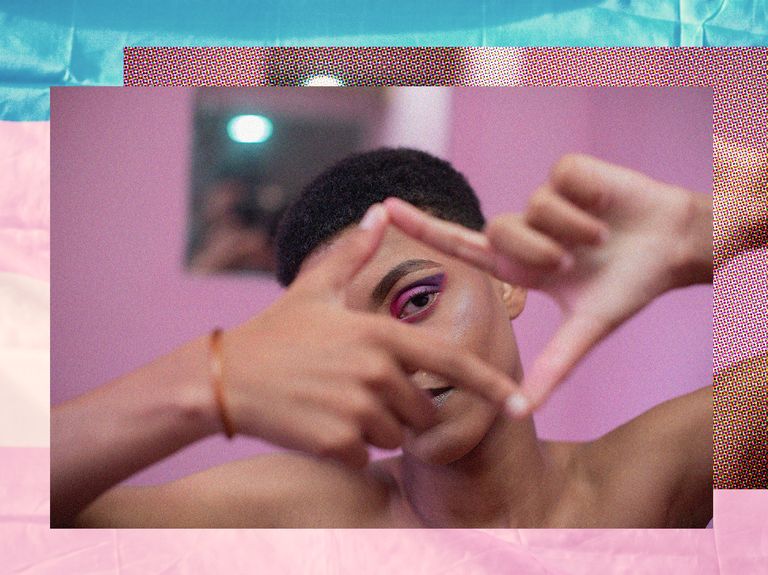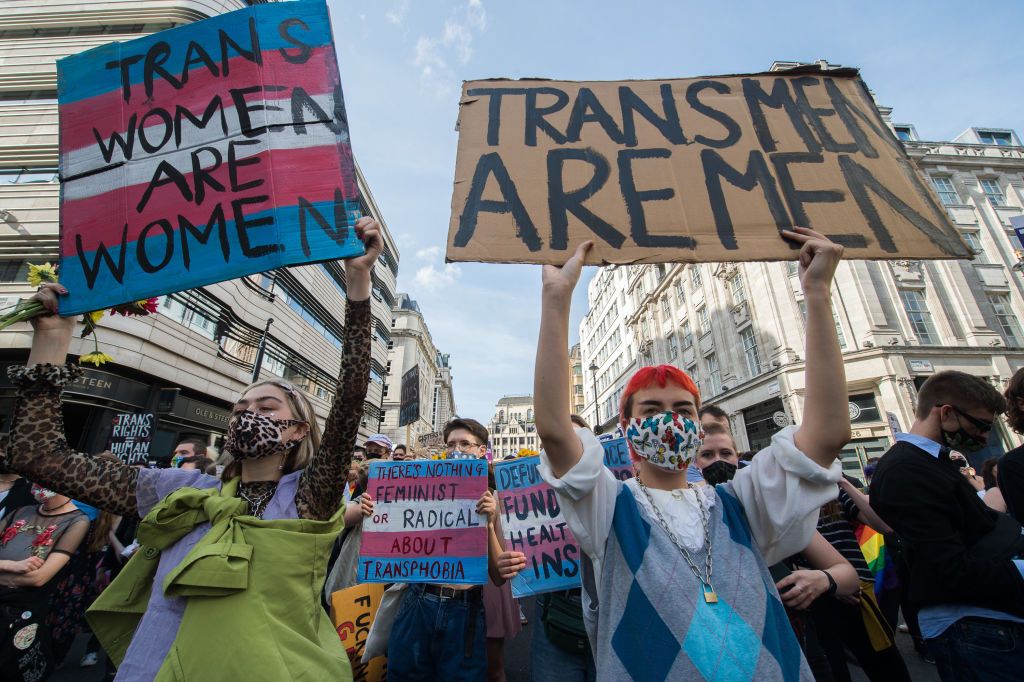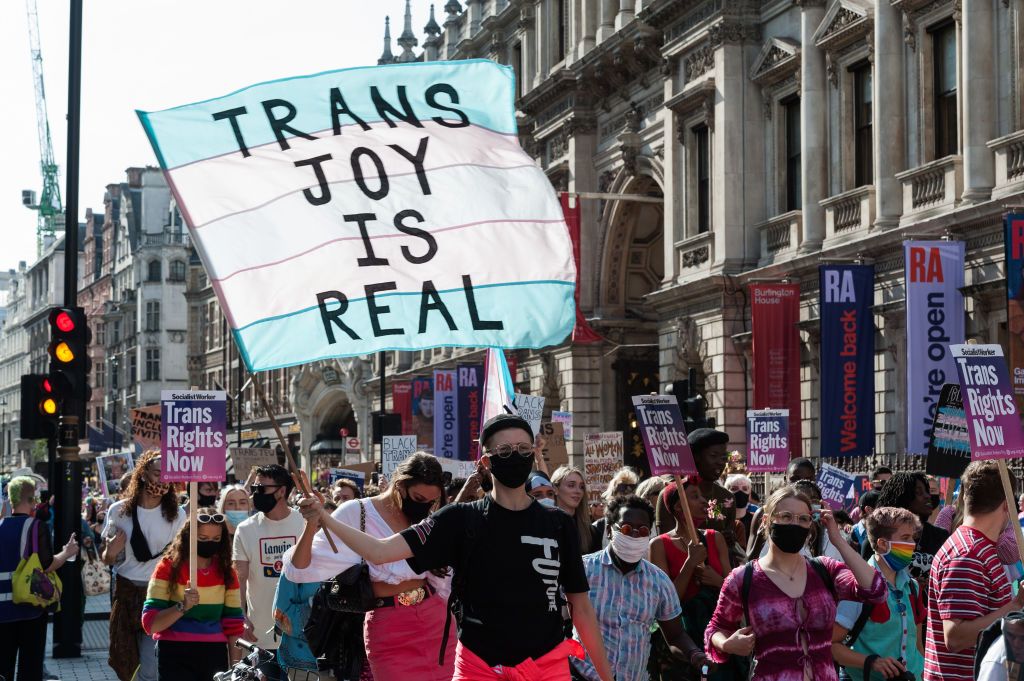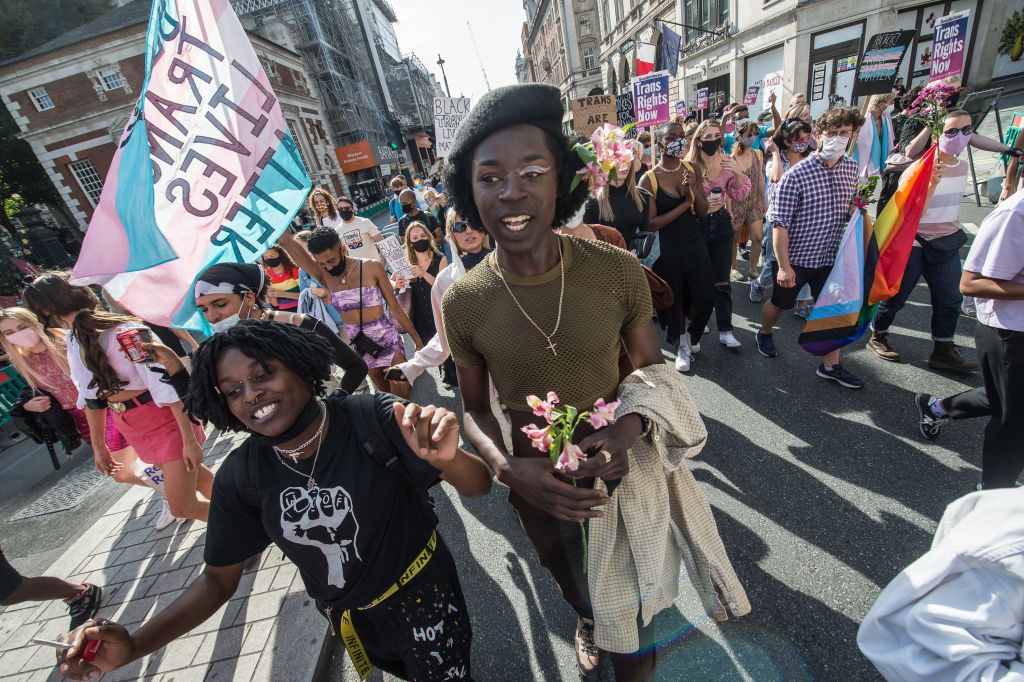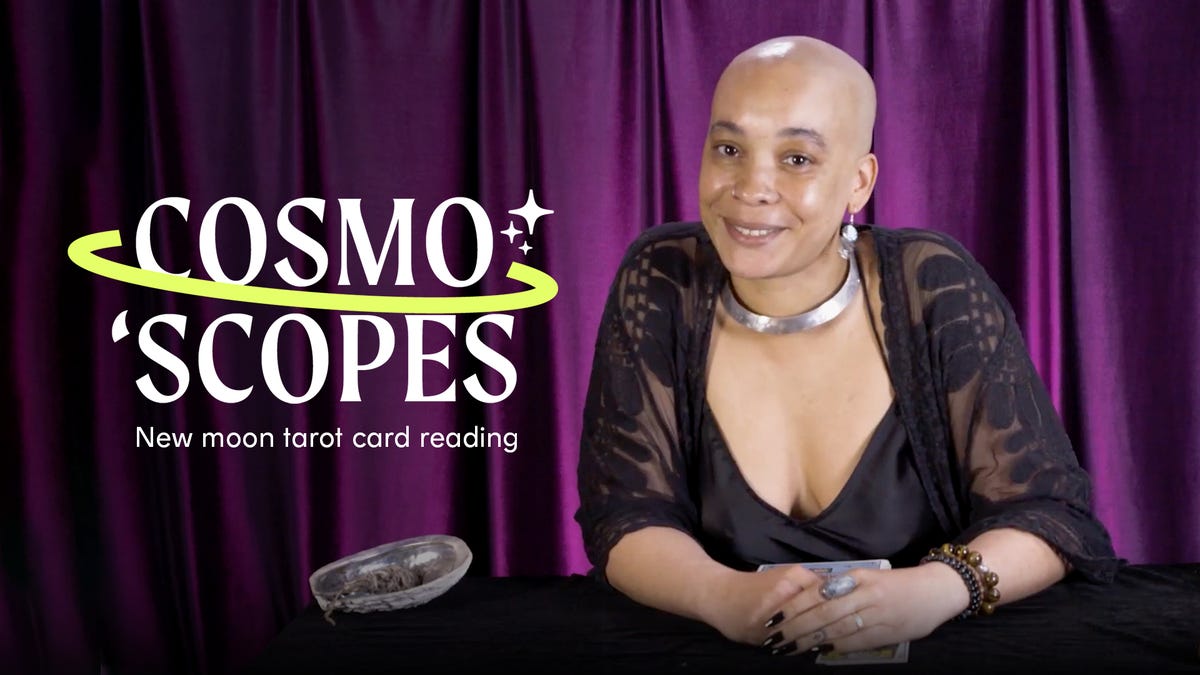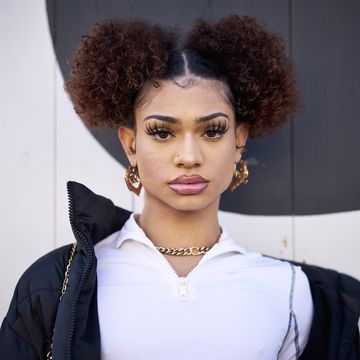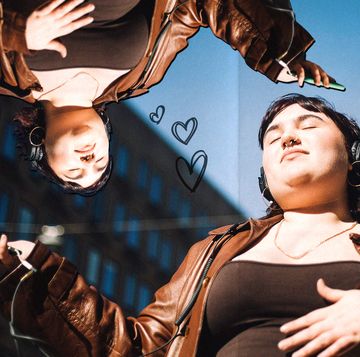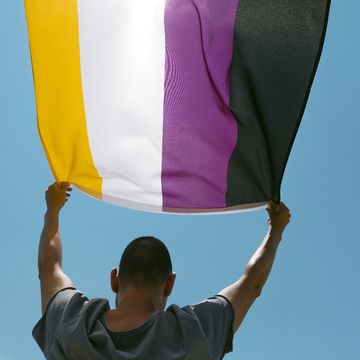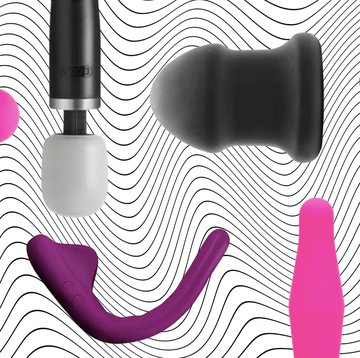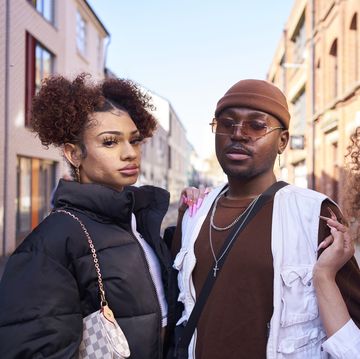Pride is a time to celebrate our diversity, strength and community. But with the challenges on the rights and lives of trans and non-binary people continuing to ramp up in the UK, this Pride season is also a time to highlight injustice and come together for equality. In response to the rising watermark of transphobia, many Pride parades around the country are dedicating their events to the T in LGBTQIA+. Pride in London, for example, recently announced that its theme this year is ‘Never March Alone: Championing Trans Allyship’.
We spoke to five activists who fight for trans rights all year round about what you need to know this Pride.
Queer solidarity is queer power
Ren Mars, a volunteer at London Trans+ Pride spoke to Cosmopolitan UK about the importance of and need for solidarity within the community, now more than ever…
“Right now, trans, non-binary and intersex people are experiencing a persistently rising tide of effort from within the LGBTQ+ community itself to position transness as an existential threat to the rights and spaces of queer cisgender men and women, and to bait them into turning on us.
In the summer of 2018, a handful of individuals - members of a small but vocal group of cisgender queer women with vehemently anti-trans views - forced their way to the front of the annual Pride in London parade, blocking the route. They carried a banner proclaiming, “Transactivism Erases Lesbians'' and handed out “gender critical” propaganda leaflets discouraging more inclusive legal gender reforms and conversion therapy policies. Five years on since [that] incident, the trans+ community in the UK is seemingly still facing down the same hateful spectre in new, slicker, more polished and seemingly thoughtful guises.
Although it’s important to note that by no means are such views the norm for the majority of our queer siblings, it’s confronting and saddening to know that to some - at very least a powerful few - trans existence within queer spaces is not wanted or appreciated.
The only real countermeasure to those seeking to exploit these anxieties and to pit segments of the LGBTQ+ community against one another is for us the rest of us to keep holding, understanding and showing up for one another. We can and must continue the work already being done to ensure these bonds don’t fray. We’re already seeing new initiatives like The Dyke Project, which formed this year to show visible and vocal trans-inclusive, lesbian-led opposition to The Lesbian Project and its belief that, “by definition only females can be lesbians, in virtue of their biological sex”.
We now also have an entire national network of regional Trans Pride events via Trans Pride UK. Like London Trans+ Pride (planned for the 8th of July) these events are opportunities to display queer strength, solidarity and love as an antidote to vitriol, and to define our community’s pride in opposition to attempts to propagate hate and division amongst us.
Queer siblings, trust that we want only to continue this fight side by side with you, as it is our only way out. Hear us, help us, lend us your support as loudly as you can. Continue to show us your love, and we will continue to fight for your rights as if they were our own - because they are. Trans, intersex, and non-binary siblings, remember that we do belong here, and trust that there are more of those than not who are willing and able to see us as we are. Remember always, that pride is never a finite resource.”
Protect trans youth
Cleo Madeleine, spokesperson for Gendered Intelligence spoke to us about the issues facing trans youth and the importance of protecting kids via the community and support they so desperately need…
"Our most pressing issue is the wellbeing of trans young people. It ties into a lot of other challenges facing the trans community - waiting times for gender identity services, for instance, and uncertainty about the future of [Gender Identity Development Service] - but it's a much wider issue and frankly a crisis.
It's commonplace understanding by now that queer young people tend to have worse mental health, but what's often less understood is how much of this stems from social and political pressures. Research from the Trevor Project has found that attacks on queer people in the media and by politicians are connected to increases in anxiety, depression, and suicidality in queer young people. This has combined with cuts to mental health services and failures of gender identity services to create a crisis in trans youth.
There's a common misconception - one often spread by unscrupulous press and anti-trans groups - that being trans makes young people unwell, but that couldn't be further from the case. Given proper support, kindness and opportunities, our young people flourish. It's unfair that time and time again they're made to suffer for political point-scoring.
Although we advocate for better healthcare and we press for change from the top, ultimately we can't singlehandedly bring down waiting times or put an end to the nonsense of the 'culture war'. What we can do, as a community, is look after our young people. Our youth groups at GI started out as a project to make space for some of London's young trans people and over the years have grown to over twenty groups a month across the UK and online. Our philosophy has remained the same: creating safe and supportive spaces for young people to find information, make friends and be themselves.
This is something that we can all do, not just as activists but as members of a community. It could mean starting an LGBT group in your school or local community, looking into training for your workplace or organisation, or signposting young people and families who are struggling to support services like Switchboard LGBT+ or our own support line.
We know from both research and experience that peer and family support are the strongest factors in the wellbeing for trans young people. That means that looking out for trans young people in your local community makes a tangible, immediate, and positive difference.”
Uplift trans voices
Felix Fern, co-founder of Trans Activism UK told us how important the power of representation in the media can be and how a weekly take-down of non-binary and trans people in the press directly influences an upswing in hate crimes…
Waking up on a Sunday morning for most people can be quite an uneventful endeavour, but for trans and non-binary people in the UK, it can bring a sense of dread at the knowledge that there will likely be yet another anti-trans article being published in the media that day, as there is almost every week without fail.
Data captured by the Dysphorum project confirmed that as of October 2022, there had been nearly 23,000 articles published on trans topics by a total of 21 mainstream media outlets since 2012, nearly 16,000 of which were either neutral in tone or explicitly anti-trans, and that theme of hostility in trans coverage has only been increasing over time.
This epidemic of anti-trans rhetoric in the public eye has two major knock-on effects. Firstly, Right-wing, biassed content spreads misinformation about the trans community, through rinse-and-repeat style repetition of ‘80s homophobic fear-mongering (as seen through the prevalence of labelling trans people and allies as “groomers.”).
In March 2022 the Home Office released its hate crime statistics for England and Wales, and it confirmed an increase across the board, but the largest by far was an abysmal 56% increase in reports of transgender hate crimes.
Secondly, Trans and non-binary people’s mental health and wellbeing are put at risk by constant exposure to harmful content that is legitimised through mainstream platforming, content that becomes far too accessible and difficult to avoid.
But we as a community are, even in the darkest of times, unbreakable. Although it may feel hopeless at times, there are so many amazing trans and non-binary journalists, writers, documentary makers, etc. who are working tirelessly to ensure that our views, our struggles and our celebrations, make their way out into the world.
Projects like Trans Writes, co-founded by Lee Hurley and Gemma Stone and Trans Media Watch, among others, are working to uplift the voices of trans and non-binary writers and work to counter the dis- and misinformation that has become so prevalent in mainstream reporting.
Trans healthcare saves lives
jane fae, director of TransActual UK and chair of Trans Media Watch spoke with us about the effects of trans-inclusive healthcare and why this is especially important during Pride month…
In the 1990's, the UK courts ruled that the NHS was obliged to support trans people with their medical needs. Thirty years on, it is clear that they are not doing so.
[Trans activists] often talk about waiting list times, but those are hind-sight mirror waiting lists. If you’re waiting for treatment, whether it’s waiting to be seen by someone in the gender identity clinic or anything else, you have likely had to wait to wait five or six years just to get seen by the NHS. And that’s just to get referred to a specialist.
It's gone beyond simple failure. It does look like some people have gone out of their way to sabotage [trans health care]. Looking at the forward waiting list, while the official figures are 5-6 years, you have to take into account the lengthy queue of people waiting in front of you.
Hence why these stories about trans kids are so inappropriate. All too frequently it takes 18 months to two years to get into the system, so they're hardly being rushed through anywhere. (In the UK, those under 18 can only access puberty blockers, not HRT or gender affirming surgery).
In the case of trans masculine [bottom] surgery (i.e; phalloplasty) there was an absolute scandal during the pandemic where the NHS allowed their surgical contract to lapse. So when they came out of the pandemic and other specialisms like hip replacements started up again, they couldn't legally start up transmasculine surgeries for at least six months because they had no contract provider anywhere in the UK.
If you look at trans affirming surgeries, you have penectomies and mastectomies where things are removed, and vaginoplasty (creating a vagina), phalloplasty (creating a penis using a skin graft), and Metoidioplasty (creating a penis using exiting genital tissue), where things are added. However, it does seem peculiar that trans surgery is put into a specialist category. Any gynaecologist or surgeon who specializes in that area can do a hysterectomy. As for mastectomy, there are some minor differences in techniques, but not over-arching. If It's performed on a trans man, it has to be a trans specialist surgeon. Why?
Trans people are not asking for special treatment in the medical system. We’re just asking for something that looks like parity.
Trans people are loved
Eva Echo, an activist, writer and public speaker discussed the value of allyship and the opportunity that Pride presents to show support and solidarity when trans people need it most…
One of the main issues we’re facing is perception and acceptance. Because if we have the public on our side vocally and we have acceptance that we do exist in society, all the other things will fall into place.
We've got to tackle the very roots of [transphobia]. We’ve come a long way and it's great that a lot of people have started using pronouns and being aware of things like misgendering and dead naming (calling someone by a name they no longer associate with), but I feel like we need to build upon that.
I would love for allies to look back and think about where we are now and what’s actually changed.
And if they can’t see actual change, think about what they can do. Because trans people are tired. We’re tired of constantly having to defend ourselves to justify ourselves.
So we would love allies to come forward and say, “when you can't shout anymore, we'll shout for you”. You can do that with things like pronouns in your email signature but also actually stepping forward to challenge misinformation.
Think of it like weeds in the garden; if you don't do anything, the weeds will take over your garden. Gender critical misinformation even got through to government and political figures. Weeds have been allowed to populate this area and we need more people to stand against that. The census 2021 confirms we are just a small percentage of the population. We can't do this on our own. We need allies.
The campaign Trans People Are Loved, which we started up recently, aims to combat hate through love by making love the loudest voice. This campaign was started by a group of trans and cis people, but it's mainly for allies for them to take over this vehicle and say yes, trans people are loved.
